- Home
- Marthe Jocelyn
Secrets Page 7
Secrets Read online
Page 7
Some kids adjusted the radio or the aerial, but it was only Jimmy who sat behind the wheel. After all, Uncle Ted was Jimmy’s uncle, so he should be the driver. Once Jimmy slipped on Uncle Ted’s white gloves, no one asked him for a turn. He put on Uncle Ted’s white driving cap backwards because the peak blocked his vision.
“Rummmn. Rummmmn!” Jimmy turned an imaginary key. All the passengers ran their engines too. I did the running commentary, telling them what we were passing. Steed’s Dairy. Bush Hardware. Armitage’s Bakery. All the sights up and down King Street. We acted like a bunch of five-year-olds.
Then Jimmy always got carried away. He tooted the horn at the Ye Olde Candy Store.
Uncle Ted would burst out of Aunt Jean’s house, hollering. “You kids get away from my car! How many times do I have to tell you?”
The kids scuttled like cockroaches back to their duplex houses. Then it was only Jimmy, Uncle Ted, and me.
Uncle Ted shook his fist at Jimmy. “And to think I put you in charge!”
He turned to me. “How could you let him do it, Cyndy?” He handed each of us a chamois and we spent the rest of his visiting time polishing kid fingerprints off that car.
“It’s not much of a punishment, is it, Cyndy?” Jimmy grinned so wide, I thought his mouth would reach his sticky-outy ears.
I do admit, now, that I liked the polishing. When you thought you were done and looked at the paint sideways, there’d be just one more print. I liked huffing my breath on the baby blue paint and then polishing the marks away. It was a challenge.
Each week the routine was the same. When Uncle Ted left, he kissed Aunt Jean good-bye. He peeled a purple ten-dollar bill from his billfold and pressed it in her hand. We gave him back the chamois. He patted my head and punched Jimmy in the right shoulder.
Although Uncle Ted Day was the most exciting day of the week, Fridays were a close second because we had group lessons at the community pool.
“What’s that on your shoulder?” I asked Jimmy one Friday.
“Just a bruise. I must have fallen.”
He couldn’t fool me. That bruise on Jimmy’s shoulder was an Uncle Ted Bruise. Each week it got darker and darker, one bruise on top of the last week’s one, on top of the one from the week before, none of them getting a chance to heal between visits.
“Uncle Ted shouldn’t hit you so hard.”
“He doesn’t mean anything by it. I’m just a softy, that’s all. And he’s like a big door. He doesn’t know his own strength.”
I squinted at Jimmy. That last part sounded like Aunt Jean’s words. Hogwash! Uncle Ted may have been as tall and as wide as a door, but he was more like a screen door to my way of thinking. There was always hot air rushing out of him.
The Thursday before school went back in, the one before Labor Day, was Aunt Jean’s summer windup canasta tournament. But she was prepared to stay home and visit with Uncle Ted like usual.
“Go. Go. Jimmy and I will be fine,” said Uncle Ted. He gave Jimmy a little love-punch in the shoulder to prove it.
Don’t go, Aunt Jean, I wanted to scream. Stay home! No words came out.
Aunt Jean put on her white gloves. She pinned her straw hat on her head and snapped her purse shut. She kissed Jimmy good-bye.
“Be good,” she said, including me.
When Aunt Jean was almost out of sight, Uncle Ted turned to me and said, “Go tell your mother she wants you.” So I went and sat on my porch.
“Jimmy, keep your little friends away from my car.” He took the paper and sat in Aunt Jean’s back kitchen, where it’s cool and he could read in peace.
The kids swarmed all over the car as usual, but with Aunt Jean gone, Uncle Ted seemed madder. I think now that his anger had been building up each week for the whole summer.
When Jimmy tooted the horn, Uncle Ted came out screaming. Even I was scared and I was not involved. He yanked Jimmy out of the car and jumped in behind the wheel. Jimmy threw himself across the trunk.
“Get off. Get off, you kids.” Uncle Ted started the engine. “I’m putting this car in gear.” The car moved forward with a jerk. Then he slammed on the brakes. Forward, slam. Forward, slam, like a baby blue bucking bronco, until all the kids, laughing, fell off the car and onto the road. All except one.
Jimmy was splayed over the trunk holding on to a handle in the backseat.
Uncle Ted zoomed off down the lane into the park, with Jimmy bouncing on the back. All the kids followed.
I ran as fast as I could. My hair streamed off my neck and I galloped, trying to go faster.
When I got down into the park, the light was getting dim. The swings and the cat-poop sandbox and the picnic tables looked soft. Uncle Ted was blowing hot air about how rich and important he was and handing Betty Lou a five-dollar bill.
I shinnied up a tree and blended in with the leaves.
When all the kids were gone, Uncle Ted turned to Jimmy. He punched him in his sore shoulder and then his good shoulder and then his sore shoulder. “So you want to drive my car, do ya? Huh? Huh?”
Jimmy kept moving back during the punching and going forward to say, “Yes, I want to drive your car!” From my perch, it looked like they were doing the cha-cha dance.
Uncle Ted pushed Jimmy with two hands. “Well, you’ll have to race me for it.”
Jimmy got on his mark, lined up with the front bumper of the car. Uncle Ted tooted the horn and they were off. Uncle Ted gunning, gunning, and Jimmy pumping his legs so fast. He did pretty good. He ran straight down the parking lot. From my angle, I thought Jimmy won, but no, there had to be a rerun.
On the rerun, Uncle Ted changed the rules of the race. The car turned into a bucking bronco. It swerved into Jimmy’s lane. It cut him off, just missing him. Jimmy kept running. When he realized that Uncle Ted was chasing him, he sped up. Jimmy ran out onto the grass. Ted didn’t care. He went up and over the log that marked the end of the parking lot and drove on the grass, trying to run Jimmy down. Jimmy darted. He dodged. He leapt out of the way and dove into the backseat of the car.
I thought he was safe now. But no, Jimmy was like a burr to be shaken loose. The car lurched and Jimmy was thrown from passenger door to passenger door and back again. Oh, those sore shoulders!
I started to get down from the tree. “Stop! Stop! Stop!” I was dangling from the lowest branch when Jimmy’s body flew out the back of the car. It arced in the air and dropped to the ground, thunk. Jimmy lay still.
The rest I already said. I can’t tell it as fast as it happened.
Apparently Uncle Ted passed Aunt Jean coming home from canasta. Aunt Jean tells how she cradled poor Jimmy’s head all the way to the hospital.
Jimmy didn’t go to school on the day after Labor Day. He hasn’t been to school yet because of his head injury.
Uncle Ted still comes on Thursdays, which is fine because Aunt Jean has no other visitors but me, and Jimmy is a peck of trouble. A peck of trouble. Aunt Jean says that a visit from her only living relative makes a nice break. It’s something to look forward to.
It is now my job to scoot the kids away from the car, which is easy because I have a new technique.
“Can Jimmy drive your car?” I ask Uncle Ted sweetly. “Those diapers he wears since he fell off the swing and hurt himself don’t leak a bit.”
Uncle Ted always lets him, but I have to put down the car blanket first. Jimmy sits behind the wheel and I go rummmn, rummmmn. He bounces up and down like a baby and the other kids stay away and watch.
When it’s time for Uncle Ted to leave and he is handing over a ten-dollar bill, I say, “Aunt Jean could do with some more handkerchiefs because of Jimmy’s drooling on account of his head injury from falling off the swing.”
Uncle Ted peels two more bills off his billfold and presses them into Aunt Jean’s hand. Then Uncle Ted goes to pat Jimmy on the head. Jimmy ducks. He tries to give me a love-punch in the shoulder. I put my two hands up like a shield and kick him in the ankle.
“Cyndy
!” says Aunt Jean.
I don’t say anything. What would be the point?
On Monday, Tuesday, Wednesday, and Friday after school, I push Jimmy on the swings. He loves to go really high and touch the sky.
Our Jimmy is not scared of anything or anybody.
Neither am I.
Uncle Cory’s Smile
Anne Gray
When I was a little girl, my uncle Cory used to hold me on his knee and read stories. He read our favorites over and over, as if he hadn’t ever read them before. His broad finger moved slowly under each line, and he pronounced the words carefully, as if they were too precious to let go.
He helped me build towers from my blocks – high, high, higher than I could reach – and no matter how often I knocked them over, he laughed along with me. I rolled on the floor and giggled until I was breathless, and watched him grin. Then he would start to build again.
Red on blue, yellow on green. That was for me.
He liked purple on red, then yellow on blue, and I tried to build that, yet I could never get mine as tall as his. “But it’s fine like that,” he’d always say. “Never mind.”
Sometimes, while we played, he would pat me on the head, and say, “I’m glad you’ve got blonde curls, just like your mom and me.”
We played firefighters and pirates and astronauts. We crawled through a cavern made from a table and sheets. And when I asked if he would dress up, or play dolls with me, he always smiled his Uncle Cory smile, and said, “I’d like that fine.”
When I got older, Uncle Cory taught me how to swim and ride my bicycle, carefully cleaning my skinned knees, and encouraging me to try again. He helped Dad build a tree house, and sewed yellow curtains along with me. My seams were pretty crooked, while his were neat and fine. We drew pictures for the walls – a squirrel, a giant bear, a tree. I drew one of him, and he drew one of me. He taught me how to bait a hook, and to wait patiently for something to bite. With our lines dangling in the water, we’d lie on our backs and look for animal shapes in the clouds.
If the evening weather was fair, Dad sometimes built a fire in the backyard. Uncle Cory and I roasted wieners and marshmallows, and we looked at stars. The stray black cat with fighting green eyes, which no one else could even touch, always curled up at his side and purred when he stroked her. When the fire had burnt low, with only glowing embers left, that’s when Uncle Cory began to sing. His voice was so clear and sweet, it made me want to cry.
On my first day of school, Uncle Cory walked along with Mom and me, holding my hand. “Be sure you always look both ways,” he said, “even when I’m with you.” He glanced at Mom, a question on his face. She smiled and agreed, “Those are the rules.”
After that, Uncle Cory took me to school each morning. “This is my best job,” he’d say. After he dropped me off, he would go to his other job, in some kind of shop. “Just making things” was all he ever told me. But when school let out, he was always waiting, laughing and talking to the crossing guard, or one of the mothers. He seemed to be everyone’s favorite.
“See you tomorrow, Cory,” they’d call out, when we started to walk away. He was invited to all the parties, right along with me.
After school on Fridays, when Fasked if he was ready to go for some chocolate chip ice cream, he smiled his Uncle Cory smile and said, “I’d like that fine.”
Luci and Jen, my two best friends at school, soon became his best friends too, though at first Jen drew away, her brown eyes wide. “He is so big,” she whispered, the first time she came to my house to play. “And it scares me when he frowns.”
But he got those crooked lines in his forehead only when he didn’t understand something, with his mouth pulled down and down. Usually when we had homework for school, he’d want to study with us, but he didn’t seem to learn. He’d press his lips together and curl his hands into fists; I knew he was trying not to cry.
In the first and second grades, he kept up pretty well because he could read better than we could, but then the lessons got too hard. He looked so sad, playing alone in our backyard. As soon as we finished our homework, we’d go outside and dance around him, holding hands in a circle.
One day, when we got to school in the morning, I saw one of the new boys point at Uncle Cory. Standing beside them, three girls laughed behind their fingers, then elbowed each other and looked over my way, their eyes narrowed with glee.
Dummy, Dummy, has no brain.
Must have washed it down the drain.
The sharp-faced boy chanted it over and over, then others began to sing along, making funny faces.
Luci was standing near them. She looked a bit ashamed, but she didn’t move off, or say anything to stop them. She just chewed on the ends of her hair and turned away. Then one of the other boys poked his tongue out of the side of his mouth, and paced around, his shoulders hunched.
I stood there, unable to move.
The first boy looked at me and grinned, all hard and mean. “Which would you rather have?” he called. “A nutbar or a fruitcake?”
“She’s already got both rolled up into one,” another boy yelled.
I looked back and saw Uncle Cory staring at them. Then he turned to me, his mouth gaping open, his eyes wide. I turned away and ran inside, even though I knew it would hurt him more than all those words. As I reached the door, I heard one boy call, “Aren’t you going to say, ’Slow long’?”
All day I kept away from Luci, even though I could see that she wanted to get me on my own. I kept away from everyone, feeling frozen inside. My eyes ached from wanting to cry.
That afternoon, when I saw Uncle Cory talking with the crossing guard, I looked away. I heard him call my name, but I ran home alone. I didn’t want to be seen with him, didn’t want to hear the boys laugh or chant their rhymes, the way they had that morning. Dummy, Dummy burned on my brain.
When I got home, I went into my room and closed the door. I didn’t want to be with Uncle Cory. I didn’t want to see the question I knew would be in his eyes – a question I didn’t want to answer, even in my own mind.
Maybe he didn’t understand, I told myself; maybe he thought it was just a game. But I didn’t really believe that, no matter how hard I tried. I threw myself on the bed, and wished that he was living somewhere else. I cried then, muffling the sound in my pillow. I didn’t go to the door when Jen and Luci arrived, even though I heard Luci call out, “I’m sorry.” I knew that she was crying too, but I didn’t want to hear her excuses. I knew they were no better than mine.
When I went to the table that night, I wouldn’t look at Uncle Cory. I didn’t want to see his eyes. Mom and Dad exchanged puzzled glances, but said nothing, so I realized that Uncle Cory had not told on me for running home on my own, though he must have been frightened. After all, looking after me was his “best job.”
We cleared the table and did the dishes, the way we always did, but he never said a word, and neither did I. Afterwards, he went to the corner of the den where we read and played, but he didn’t ask me to join him. That’s when I knew for sure that he understood. My throat felt like I had swallowed a hard-boiled egg, shell and all. I watched as he pulled out those blocks we hadn’t used in a very long time. He was fighting back tears as he slowly built a tower. Red on blue, yellow on green. He hadn’t forgotten the colors for me.
I ran to my room, biting on my fist, and pictured those boys and girls at school, all cruel and cold. Heard them chant Dummy, Dummy. I thought of all the fingers pointing at Uncle Cory, then at me.
My own fingers seemed to point at me, too. I wondered if my eyes had also frozen him, and felt the shame grow. How could I have left him with those words still in his ears?
I looked out of my window, and saw the tree house in the light of the moon. I thought about the green-eyed cat, how gentle she had been with Uncle Cory. Uncle Cory had always sung my favorite songs first, while the embers of our fire still glowed. All that was worth facing down the ugly chants.
When I walked
back into the den, the tower he had built was very high. Uncle Cory glanced up, then returned to his building. I sat down beside him, and began to build too.
Purple on red, then yellow on blue.
He watched my hands, and clasped his own in front of his chest, letting out a low sigh. After a while, I said, “Want me to read to you from my new book?”
He looked up, not quite sure.
“And tomorrow,” I said, “on the way home from school, we’ll go down to the ice-cream parlor and get some chocolate chip ice cream.”
Uncle Cory went to bed happy that night, but I couldn’t sleep, wondering what would happen when we got to school the next day. I thought how those boys would chant Dummy, Dummy, and wondered how I could face them.
I could be just as hateful. I could call out about elephant ears and potato noses and filthy clothes and stinky smells, and ask, “If you’re so smart, why do you always fail your tests?” and then smirk. I tossed and turned all night, thinking of ugly things to say to the boys. And to the girls, too. That would make me as bad as they were, but what else could I do?
I was so sleepy in the morning, I could hardly eat breakfast. I could tell Mom was worried, and Uncle Cory, too. He whispered, “Do you want your mom to take you to school?”
I shook my head. “Unless you don’t want to.”
He swallowed hard. “That’s my best job,” he said.
I wasn’t sure this was still true. As we walked, I realized I had to be as brave as he was, and not say the nasty things I’d planned.
My stomach churned as we got near to school, but I held my head up. The boys were waiting, and the girls, all grins and hugging their fists in their armpits.
Uncle Cory could have walked away; he’d done his job. But he stayed beside me. When the boys began to call, I almost forgot that I’d decided not to be mean; I almost said the meanest thing of all. I almost said, “If anyone cared about you, you wouldn’t have to be so cruel.”
But right now, I didn’t care about them. I knew I’d have to face them another day, and probably another. Someday I might say words more spiteful than theirs, but I didn’t want Uncle Cory to see me acting mean.

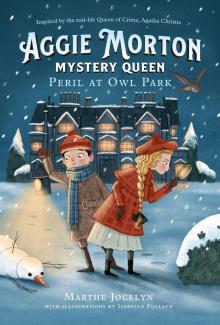 Peril at Owl Park
Peril at Owl Park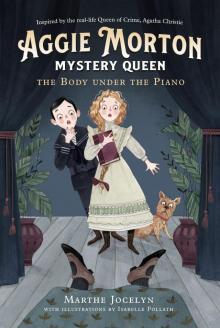 The Body under the Piano
The Body under the Piano Mable Riley
Mable Riley Earthly Astonishments
Earthly Astonishments How It Happened in Peach Hill
How It Happened in Peach Hill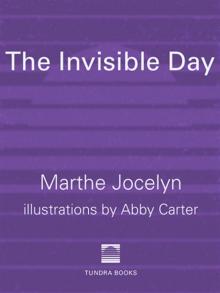 The Invisible Day
The Invisible Day The Invisible Harry
The Invisible Harry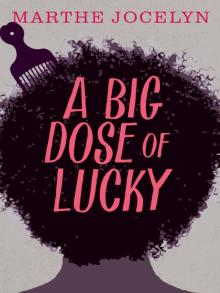 A Big Dose of Lucky
A Big Dose of Lucky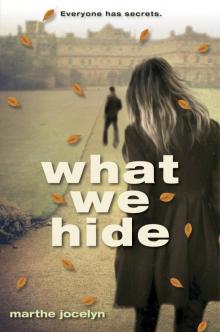 What We Hide
What We Hide Would You
Would You Secrets
Secrets First Times
First Times The Invisible Enemy
The Invisible Enemy Folly
Folly